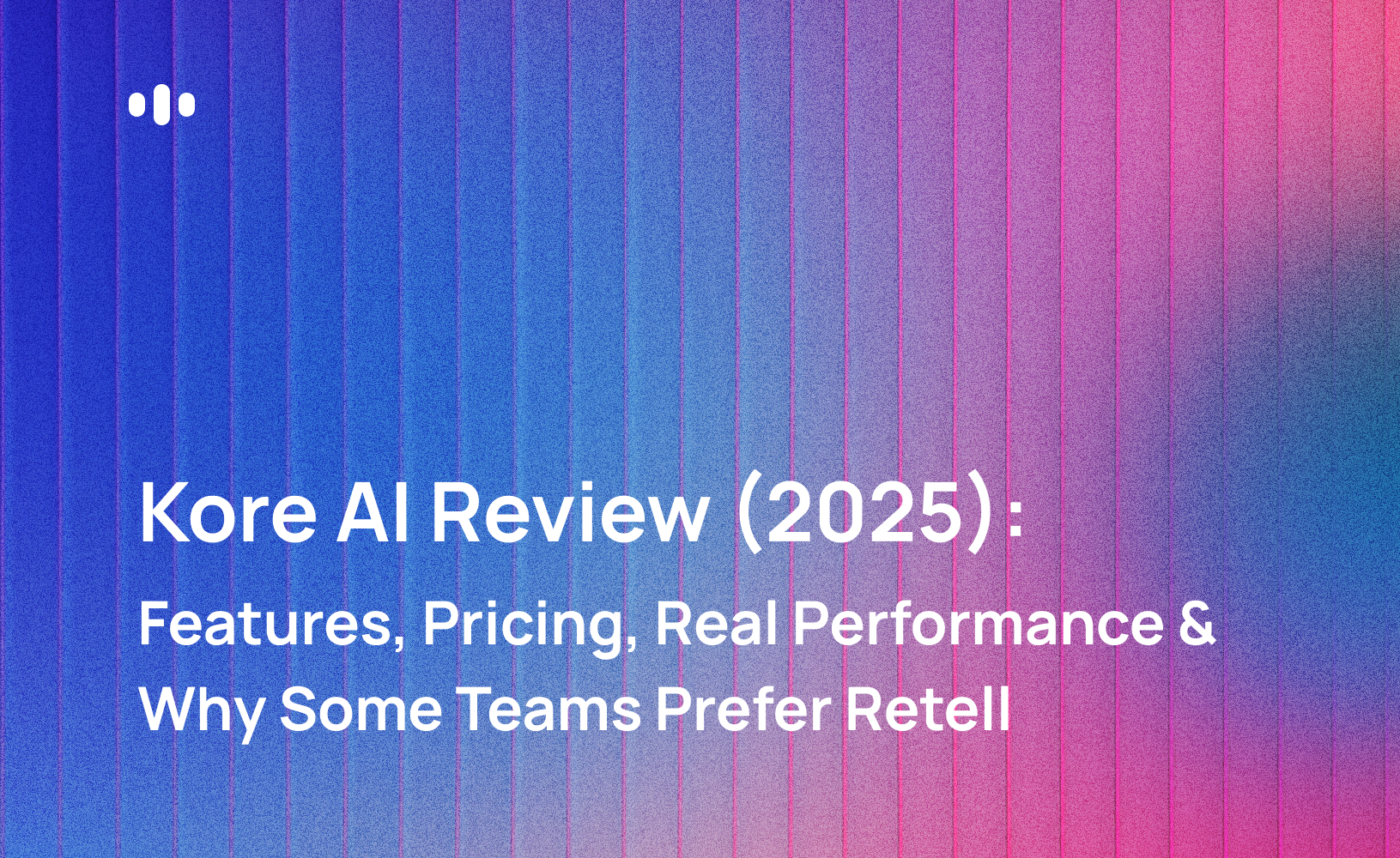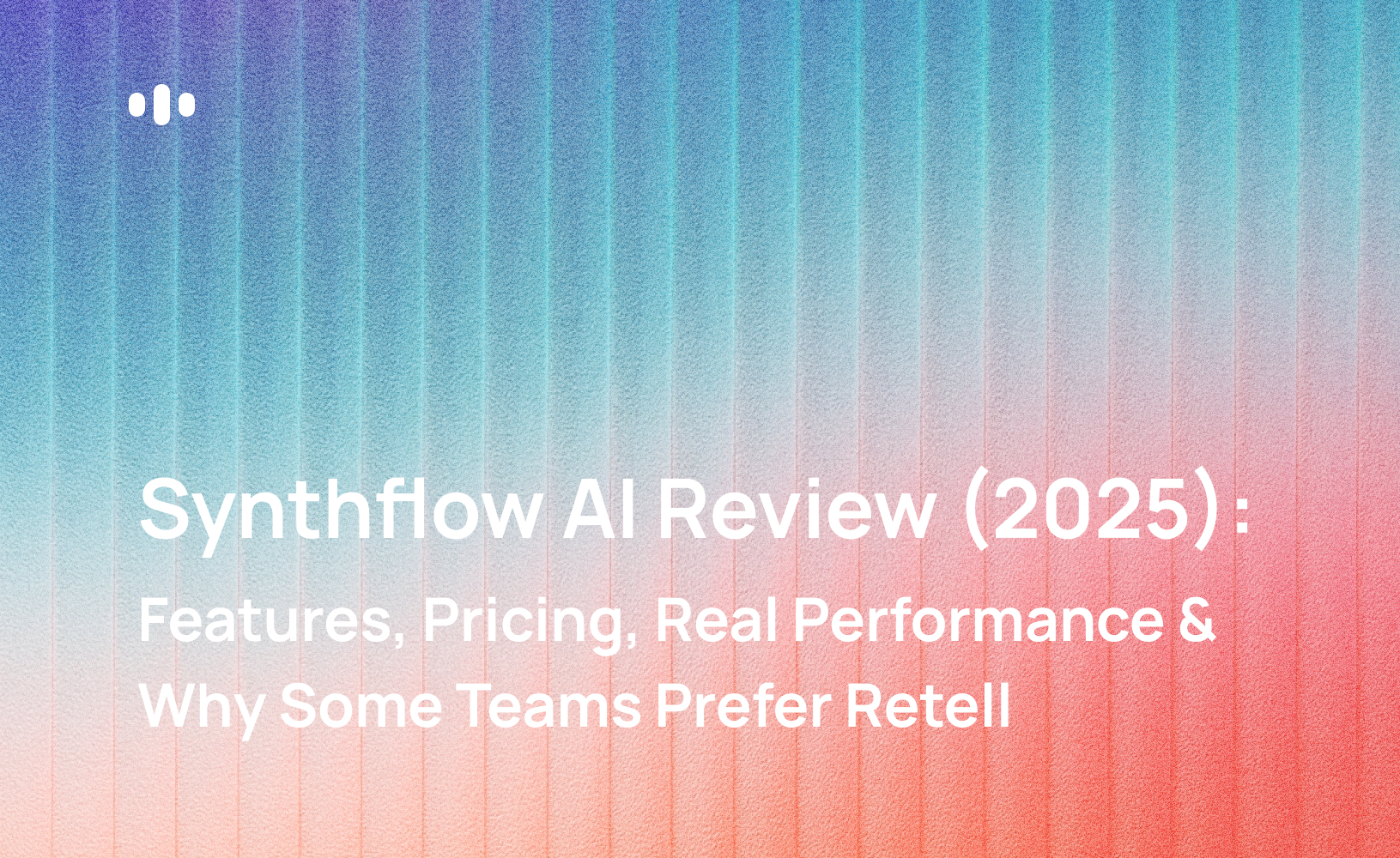The on-demand service industry thrives on speed and convenience, but meeting these demands isn’t always easy. Businesses like ride-hailing, towing, and microtransit services are under constant pressure to deliver instant, reliable, and personalized support. Yet, traditional call centers often struggle with long wait times, inconsistent service, and rising operational costs—leaving customers frustrated and businesses stretched thin.
This is where AI voice agents step in, reshaping the way on-demand services connect with their customers. These systems go beyond automating routine tasks. They provide 24/7 availability, real-time personalized responses, and the ability to handle customer interactions at scale, helping businesses stay ahead in a fiercely competitive landscape.
In this article, we’ll explore how AI voice agents are transforming on-demand services, from solving operational challenges to driving customer satisfaction. You’ll also find actionable insights to implement this game-changing technology in your business and stay future-ready.
The Role of AI Voice Agents in On-Demand Services
AI voice agents are revolutionizing customer interactions in the on-demand service industry. Unlike traditional Interactive Voice Response (IVR) systems that rely on pre-recorded messages and keypad inputs, AI voice agents utilize advanced technologies to engage in natural, human-like conversations. This enables them to understand and respond to a wide range of customer inquiries with greater flexibility and personalization.
Key Benefits
- Speed and Efficiency: AI voice agents can handle multiple customer requests simultaneously, significantly reducing wait times and improving overall service efficiency.
- 24/7 Availability: They provide continuous support, ensuring customers receive assistance at any time, even outside of regular business hours.
- Cost-Effectiveness: By automating routine inquiries, AI voice agents reduce the need for large human support teams, leading to substantial cost savings.
- Personalized Interactions: Leveraging customer data, these agents deliver tailored responses, enhancing the customer experience and building stronger relationships.
- Scalability: AI voice agents can effortlessly manage increased demand without additional infrastructure, making it easier for businesses to scale operations during peak times.
Examples of On-Demand Services Benefiting from AI Caters To
AI voice agents are uniquely equipped to address the specific challenges faced by different on-demand services. By tailoring their capabilities to the needs of each sector, they help streamline operations, improve customer interactions, and create more efficient workflows. Let’s take a closer look at how they bring value to various industries:
Towing Services
For drivers stranded on the road, time is critical. AI voice agents streamline roadside assistance by collecting essential details like the vehicle's location and issue through natural conversation. Unlike traditional systems that rely on manual call transfers or rigid menus, AI agents provide a smoother experience by automating the request and dispatch process.
- Reduced Wait Times: During emergencies, AI voice agents can instantly process requests, assign the nearest available tow truck, and keep customers updated in real-time. This eliminates the frustration of waiting on hold or repeating information to multiple representatives.
- Enhanced Accuracy: With GPS integration and conversational capabilities, AI ensures precise location tracking and dispatching, reducing errors that delay assistance.
Ride-Hailing Platforms
Ride-hailing services thrive on convenience and speed. AI voice agents take the customer experience further by making booking a ride as simple as speaking a command. Whether resolving an issue with a canceled ride or clarifying a fare discrepancy, these agents ensure timely support without the hassle of navigating menus.
- Voice-Activated Bookings: Customers can book rides hands-free by simply stating their destination. AI processes the request and provides real-time updates on ride availability.
- Automated Issue Resolution: Common ride problems, such as cancellations or disputes, are handled efficiently through pre-trained AI workflows, minimizing downtime and customer frustration.
Paratransit Services
For elderly or disabled riders, paratransit services are a lifeline. AI voice agents bring reliability and convenience to the forefront by automating scheduling, sending reminders, and providing updates on ride status.
- Enhanced Scheduling: AI can process complex scheduling needs, such as recurring pickups or specific accessibility requirements, ensuring every rider’s needs are met.
- Real-Time Updates: Riders and their families can receive automated notifications about the vehicle’s estimated arrival time, reducing uncertainty and enhancing peace of mind.
Microtransit Solutions
Microtransit services aim to optimize shared transportation through flexible routes and schedules. AI voice agents help operators manage these dynamic systems more effectively while ensuring a seamless experience for riders.
- Optimized Ride Pooling: AI analyzes passenger demand and vehicle capacity to suggest the most efficient pooling options, saving time and resources.
- Seamless Route Adjustments: When delays or route changes occur, AI voice agents quickly inform riders and provide alternative solutions, ensuring minimal disruption.
Why AI Voice Agents Are the Future of On-Demand Services
The future of on-demand services is being shaped by smarter, more efficient ways to connect with customers. AI voice agents go beyond traditional support systems, removing bottlenecks and introducing adaptable, dynamic solutions. Here’s how they’re redefining the industry.
Meeting Modern Customer Expectations
Today’s customers demand fast, effortless, and tailored support. Whether scheduling a microtransit ride, resolving towing issues, or managing ride-hailing concerns, they expect businesses to deliver seamless solutions instantly. AI voice agents are designed to meet these expectations with efficiency and precision.
Key Benefits:
- Context awareness: Understands the customer’s situation based on prior interactions, ensuring more relevant and personalized responses.
- 24/7 availability: Ensures queries are resolved any time of day or night, providing continuous support.
- Seamless handling of complex requests: AI agents can manage multi-step processes like booking services or issuing updates.
- Enhanced customer satisfaction: A smooth, fast, and intuitive experience that leaves customers feeling valued.
Streamlining Operations for Businesses
AI voice agents bring operational efficiency by automating routine tasks and reducing the margin for human error. They free up human agents to focus on more complex and nuanced issues, resulting in better resource allocation and service delivery.
Key Benefits:
- Task automation: Handles FAQs, bookings, and simple inquiries without human intervention.
- Error reduction: Delivers consistent and accurate responses, minimizing mistakes.
- Cost savings: Reduces the need for large support teams, cutting overhead costs.
- Scalability: Effortlessly manages surges in demand without requiring additional infrastructure.
- Valuable data insights: Tracks interactions to identify process bottlenecks and suggest improvements.
Adaptable and Built for the Future
AI voice agents are highly adaptable, integrating seamlessly with existing business systems and continuously improving through advanced large language models. This makes them a long-term investment for businesses looking to stay competitive in the on-demand economy.
Key Benefits:
- System integration: Connects with CRM platforms, booking tools, and mobile apps for a unified customer experience.
- Personalization: Leverages customer history to deliver tailored recommendations and proactive support.
- Self-learning capabilities: Continuously refines its understanding and improves responses with each interaction.
- Future-proof technology: Adapts to evolving customer needs and industry trends, ensuring relevance over time.
- Operational flexibility: Easily incorporates new platforms or processes, scaling alongside business growth.
How to Implement AI Voice Agents in Your Business
Integrating AI voice agents into your business can revolutionize how you handle customer interactions, but a strategic approach is essential to ensure success. From understanding your needs to fine-tuning performance, here’s how to effectively implement AI voice agents in your operations:
Assessing Your Business Needs
Implementing AI voice agents starts with a clear understanding of your business's unique requirements and priorities. Identifying where these agents can add the most value ensures a seamless integration and maximizes the return on investment. Here's what you need to check:
- High-Volume Tasks: Begin by identifying repetitive, high-frequency customer interactions that can be automated. These often include tasks such as answering FAQs, processing bookings, providing order or service status updates, and handling simple troubleshooting requests.
- Peak Traffic Analysis: Look at times when customer demand surges—such as during emergencies for towing services or peak commute hours for ride-hailing—and evaluate how AI voice agents can assist during these periods.
- Complexity Evaluation: Categorize interactions based on complexity. For routine, straightforward queries, AI voice agents can take over entirely, while leaving complex or emotionally charged issues for human agents.
- Response Times: Evaluate how quickly your current system handles customer inquiries. Long delays may indicate an opportunity for AI agents to provide instant responses and reduce waiting periods.
- Consistency in Service: Determine whether your business delivers uniform customer experiences. If responses vary depending on the agent, AI can standardize interactions and ensure high-quality service every time.
- Scalability Challenges: Assess whether your current system can handle increased demand without straining resources. AI voice agents can address scalability needs by managing surges without requiring additional infrastructure or personnel.
Training AI Voice Agents for Your Specific Industry
Tailoring an AI voice agent to your industry is essential for delivering relevant and effective customer interactions. A customized approach ensures the agent understands and responds appropriately to the unique demands of your business sector. Here's how to achieve this:
- Utilize Real Call Scripts: Train your AI using actual customer interaction transcripts to ensure it handles real-world scenarios effectively.
- Incorporate Industry-Specific Terminology: Ensure the AI understands and uses the specific language and jargon of your industry for accurate and relevant interactions.
- Address Language and Cultural Nuances: Equip the AI to recognize regional dialects and cultural expressions to provide personalized and respectful customer experiences.
- Ensure Seamless Integration with Existing Systems: Connect the AI with your current CRM, booking software, and communication tools to streamline operations and maintain consistency.
- Implement Continuous Learning Mechanisms: Regularly update the AI's knowledge base and algorithms to adapt to evolving industry trends and customer expectations.
Monitoring and Optimizing Performance
Implementing AI voice agents isn’t a one-and-done process. Continuous improvement is essential for maximizing their effectiveness. Here's how to effectively oversee and refine your AI voice agents:
- Monitor Performance Metrics: Regularly track key indicators such as response times, accuracy, user satisfaction, and interaction volumes to assess the effectiveness of your AI voice agent.
- Collect User Feedback: Encourage users to provide input on their experiences to gain real-world data for making necessary adjustments.
- Analyze Interaction Data: Review call transcripts and usage patterns to identify common issues, misunderstandings, or areas where the AI could perform better.
- Update Training Data Regularly: Refresh the AI's training datasets to include recent and diverse examples, helping it adapt to new language trends and user queries more effectively.
Elevate Your Customer Support for On-Demand Service with Retell AI
From ride-hailing to towing and microtransit, AI voice agents enable companies to overcome operational challenges, scale effortlessly, and provide exceptional customer experiences. If you’re ready to take your service to the next level, Retell AI offers cutting-edge solutions tailored to your industry. With seamless integration, customizable features, and a commitment to excellence, Retell AI can help you deliver fast, reliable, and customer-friendly support that keeps your business ahead of the curve.
Don’t wait—future-proof your operations today. Schedule a demo with Retell AI or consult our experts to see how we can help you exceed customer expectations and take your service to the next level.
.avif)


